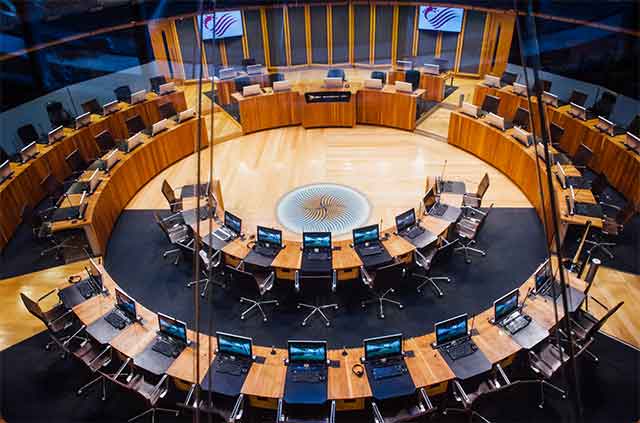Voters should have a right to remove misbehaving Senedd members from office between elections to restore trust in politicians from all-time lows, a committee heard.
Jane Dodds, the Lib-Dem MS for Mid and West Wales, called for the Senedd to adopt a similar system of recall to the UK Parliament.
Ms Dodds won a 2019 by-election that was triggered by a recall petition after Chris Davies, the former Brecon and Radnorshire MP, was convicted of two counts of expenses fraud.
She lost her seat to the Conservatives’ Fay Jones three months later in a general election called by Boris Johnson, before winning her Senedd seat in 2021.
The former MP pointed out that the then-prime minister would himself have been prone to a recall petition, suggesting he stood down for that reason.
‘All-time low’
Giving evidence to an inquiry about accountability, which is considering whether Wales should follow Westminster, Ms Dodds said: “For me it’s about democratic accountability.
“It’s extremely important to people, I feel, to have that democratic deficit addressed.
“That is if their MS has committed serious misconduct, they should have the right to express a view as to whether they want that person to remain in the role.
“We need to be more transparent about the way that we do it and much clearer because we’re at an all-time low with trust in us. And this, for me, is a step in the right direction.”
The Lib Dems’ leader in Wales added: “I wasn’t in Westminster long. The behaviour I saw though … most of them could have had a recall petition triggered given it was Brexit time.
“It was shocking the language and the behaviour.”
‘Fed up’
Ms Dodds raised concerns about the six-week window for people to sign recall petitions coupled with a by-election, saying the public was fed up with such a long campaign.
She told the standards committee that electoral registration officers in Powys struggled to find recall petition signing stations due to the six-week window.
Ms Dodds said 19% signed the 2019 recall petition, the only one to be held in Wales so far, with by-elections triggered by hitting 10% – a threshold she felt was “about right”.
Natasha Asghar, a Conservative member of the committee, asked if Westminster has got recall right or whether there need to be tweaks for Wales.
Ms Dodds said the first-past-the-post electoral system lends itself to by-elections but the Senedd faces a challenge implementing recall under a fully proportional system.
‘Waiting game’
The Lib Dem said Westminster got elements of the reforms right “but I think the power, for me, is still not with the people or with a democratic representative body”.
She raised concerns about having to wait on the Conservatives to trigger the 2019 petition, warning: “There was still a waiting game. For me, it shouldn’t be down to the political party.”
Vikki Howells asked about Westminster’s recall criteria: a prison sentence of less than 12 months, a suspension of 10 days or more, or an expenses-related conviction.
Ms Dodds told the committee chair she agreed with the criteria but suggested other triggers, such as deception, could be included in Wales’ system.
Ms Howells raised concerns about MSs changing allegiance post-election, with more than 10% of members switching party at least once in the previous Senedd term.
‘Consequences’
Ms Dodds argued against a right of appeal on recall: “People know the standards expected … as with a contract of employment, if you breach that then you know the consequences.”
She called for the “very high” 12-month custodial sentence threshold, above which Senedd members are already automatically disqualified, to be changed.
“Any custodial sentence, suspended or not, should be the trigger,” said the Lib Dem, who reiterated her party’s position that imprisonment should be rarely used.
Mark Drakeford, the former first minister, said witnesses have called for recall decisions to be subject to approval by a vote of the whole Senedd.
Ms Dodds told the committee the UK Parliament does not vote to trigger a petition as she questioned suggestions the Senedd could have a greater say.
‘Challenge’
She warned a Senedd vote, whether a simple majority or a two-thirds supermajority, risks politicising the process.
Ms Dodds suggested such a veto would be unacceptable: “To have the standards committee putting a vote to the Senedd is not putting it in the hands of the electorate.”
Peredur Owen Griffiths asked how a recall system could work under Wales’ closed-list electoral system which will see people voting for parties rather than candidates in 2026.
Ms Dodds said closed lists present a challenge but it would be straightforward to replace an unseated MS with the next name on a political party’s list of up to 12 candidates.
She cautioned that the electorate will have no say in the ordering of candidates on lists unlike under the single transferable vote, her preferred electoral system.

